2018湖北省高三4月调考英语试题
【英语】湖北省宜昌市2018届高三4月调研考试英语试题
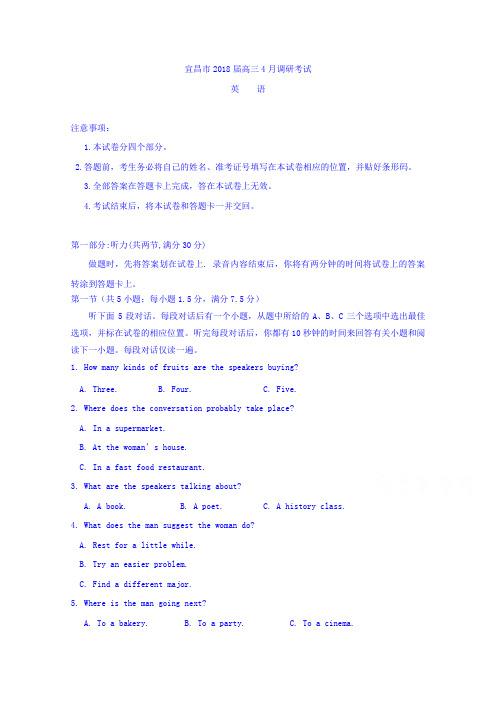
宜昌市2018届高三4月调研考试英语注意事项:1.本试卷分四个部分。
2.答题前,考生务必将自己的姓名、准考证号填写在本试卷相应的位置,并贴好条形码。
3.全部答案在答题卡上完成,答在本试卷上无效。
4.考试结束后,将本试卷和答题卡一并交回。
第一部分:听力(共两节,满分30分)做题时,先将答案划在试卷上. 录音内容结束后,你将有两分钟的时间将试卷上的答案转涂到答题卡上。
第一节(共5小题;每小题1.5分,满分7.5分)听下面5段对话。
每段对话后有一个小题,从题中所给的A、B、C三个选项中选出最佳选项,并标在试卷的相应位置。
听完每段对话后,你都有10秒钟的时间来回答有关小题和阅读下一小题。
每段对话仅读一遍。
1. How many kinds of fruits are the speakers buying?A. Three.B. Four.C. Five.2. Where does the conversation probably take place?A. In a supermarket.B. At the woman’s house.C. In a fast food restaurant.3. What are the speakers talking about?A. A book.B. A poet.C. A history class.4. What does the man suggest the woman do?A. Rest for a little while.B. Try an easier problem.C. Find a different major.5. Where is the man going next?A. To a bakery.B. To a party.C. To a cinema.第二节(共15小题;每小题1.5分,满分22.5分)听下面5段对话或独白。
武汉市2018届高中毕业生四月调研测试(英语)

武汉市2018届高中毕业生四月调研测试英语试卷本试题卷共12页,72题。
全卷满分150分。
考试用时120分钟★权考试顺利★注意事项:1.答题前,先将自己的姓名、准考证号填写在试题卷和答题卡上,并将准考证号条形码粘贴在答题卡上的指定位置。
2.选择题的作答:每小题选出答案后,用2B铅笔把答题卡上对应题目的答案标号涂黑。
写在试卷、草稿纸和答题卡上的非答題区域均无效。
3.非选择题的作答:用黑色签字笔直接答在答题卡上对应的答题区域内。
写在试卷、草稿纸和答题卡上的非答题区域均无效。
4.考试结束后,本试卷和答题卡一并上交。
BWhen I graduated from the University of lowa last year, I did something my friends did not understand. I left lowa,,where I had friends and stability, to live on a small houseboat near San Francisco. At school, I had found a job driving a school bus so people asked, "Why on earth are you leaving?”Well,at graduation I was presented with two things — a degree in psychology and a question. It was the same one that many in my generation got::" What do I do now?" It was as difficult as it was common .That's because many people at my age were raised with the same words, repeated over and over by parents, teachers and TV, that you “can be whatever you want to be”As a young boy, every time when I was puzzled about my future, they would say that they would be happy if I was happy. However, what I needed was concrete advice but not a vague idea, for example, "be a doctor, or be a bus driver."My experience was by no means universal. Many Americans are taught by their parents that the only purpose in life is to attain money and power. As a goal, this seems much easier and clearer than finding "happiness" or "gentleness". The result of this upbringing is that many of my classmates did not specialize in any particular skill, rather assuming that something would magically happen to overcome their problems. They often get a real shock when they enter the “real world” and find that their options are very limited. Many of my friends have taken jobs as waiters or cooks after graduating, or have moved back in with their parents.My life on the boat is hard at times, especially during storms. But this is my small attempt to be happy on my own. I'm not buying into my nation’s idea of limitless possibilities because I feel that stops the growth of today’s youth.25.Why was the friends confused about the writer’s leaving?A. He was tired of drivingB. He suddenly quit schoolC. He would lose his friendsD. He would lead a changing life.26. What does the author think of the guidance he got from American society ?A. It's specificB. It’s wrongC. It's generalD. It’s correct27. What directly caused a lot of Americans to have jobs lower than their expectations?A. Their achievable goals.B. The practical guidance.C. Being shocked by the real world.D. Lacking professional competence.28. Which of the following can be the best title for the text?A. Stay where you are.B. Be whatever you want to be.C. Blind faith in an industrial society.D. Mistaken belief in limitless possibilities.DWhen a mathematics student was examined in the hospital, Dr. John Lorber discovered that he had almost no brain at all. Normally, the condition is quite severe in the first months of childhood. Even when someone survives he or she is usually seriously disabled. Somehow,though, the student had lived a perfectly normal life and went on to gain a degree in mathematics. This case is by no means as rare as it seems.Professor Lorber has identified(确认) several hundred people who have very small brains but who appear to be normal intelligent people. Some of them he describes as having "no detectable brain", yet they have scored up to 120 on IQ tests.No one knows how people with "no detectable brain" are able to function at all, let alone graduate in mathematics. One suggestion is the old idea that we only use a small percentage of our brains anyway—perhaps as little as 10 per cent. But more recent research shows this idea is a misunderstanding dating from research in the 1930s in which the functions of large areas of the brain could not be determined and were named "silent", while in fact they are linked with important functions like speech and abstract thinking.The other interesting thing about lorber's findings is that they remind us of the secret of memory. At first it was thought that there is a part in the brain for memory, like the memory chips in a PC. But further research of the brain has turned up the surprising fact that memory does not depend on any particular area in the brain. As one scientist put it ,“Memory is everywhere in the brain and nowhere.”But if the brain is not a place for classifying and storing experiences and analyzing them to enable us to live our lives, then what on earth is the brain for? And where is the seat of htthen what on earth is the brain for? And where is the seat of human intelligence? Where is the mind?29. What will usually happen to a very young baby without brain?A. It will die.B. It will surviveC. It will be intelligentD. It will become disabled30.What is the new finding of the functions of brain?A. Much of the brain is usefulB. The brain is in fact of no useC. The brain determines one's IQ.D. Only a small part of the brain七选五These days when someone says a computer has a bug(臭虫)in it,usually they means that there’s a problem with one of its programs. Maybe your computer crashed when you were in the middle of a game. 36 .But back in the early days of computers, a woman named Grace Hopper was part of the team that discovered the very first computer bug.37 She had been invited to help program a new computer. The job of which was to quickly deal with the math problems ships used to find their way. 38 .Then it translated the patterns of holes into the math problems it was supposed to solve.One afternoon in 1947 Hopper and her team were running a program. But the computer wasn't giving them the right results. 39 They finally ended up taking the computer apart,looking for problems. What did they find? It was a dead moth(飞蛾)! The moth was blocking some of the holes on the paper— no wonder the computer didn‘t know what to do.Hopper knew that the term "bug" had been used before when there were problems with machines. But this was the first time a computer had ever had a bug. 40 Some people think Hopper was the first person to use the word "debug" to mean "get rid of the problems in a computer”.A What could be wrong?B. Hopper was a mathematicianC. Who had operated the computer?D. Hopper was a hardworking scientistE. She thought it was funny that it was a real one.F Or you got an error message when you tried to go to a websiteG. The computer worked by reading instructions from a long piece of paper with holes in it短文改错(共10小题;每小题1分,满分10分)I once had a bad experience. One day several years ago, I went shop with my friends. As l entered a small shoe store, but I saw two women selecting shoes. Suddenly they raise their voice and began to talk loudly about how beautifully the shoes were and how low the price was. Just then an old couple walked onto the s hop. The two women urged her to buy a pair .When the couple left a store with the shoes, I noticed the shop owner give the two women some cashes. He also promised offer them more unless more people bought his shoes.完形填空(共20小题;每小题1.5分,满分30分)Justin knew there was only one way out of his neighborhood- basketball. So he 41 hard, running with the ball like the 42 dogs were chasing(追逐) him. He could defeat any of the guys at the 43 ,and he saw his way out and he ran for it..One day when Justin was playing basketball, he 44 his right knee badly. The doctor said he might never play 45 . Justin was extremely sad. Every day Justin just 46 in bed, watching TV and eating potato chips. When he 47 like a balloon, his sister came home from the university on holiday, bringing exciting 48 of a faraway land called college.Justin was 49 by the dorm room stories and campus(校园)50 that she told, but he could 51 believe any of it. It was as if she were telling him about some 52 land high above the clouds.Justin was a pretty 53 guy, but his sister had a way of 54 him to do things that nobody else could. So while she was home on 55 , they studied together, and they talked ,and they worked, and Justin felt 56 than he ever had before.After spending those 57 with his sister, Justin realized that he didn't want to feel bad for himself any more ,and he didn't want to quit Basketball 58 be his thing, but now there was only 59 . Using the study skills Justin had acquired from his sister, he scored 60 in every exam. The university that he applied to accepted him.。
【英语】湖北省孝感市应城一中2018届高三下学期4月调考英语试题(有部分答案)
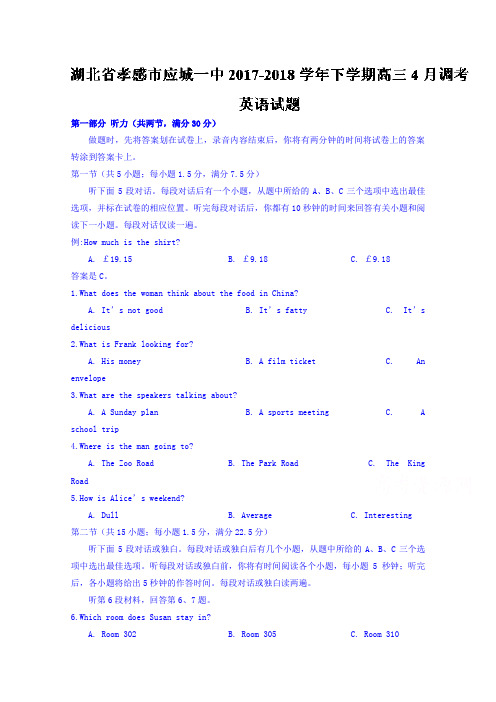
第一部分听力(共两节,满分30分)做题时,先将答案划在试卷上,录音内容结束后,你将有两分钟的时间将试卷上的答案转涂到答案卡上。
第一节(共5小题;每小题1.5分,满分7.5分)听下面5段对话。
每段对话后有一个小题,从题中所给的A、B、C三个选项中选出最佳选项,并标在试卷的相应位置。
听完每段对话后,你都有10秒钟的时间来回答有关小题和阅读下一小题。
每段对话仅读一遍。
例:How much is the shirt?A. £19.15B. £9.18C. £9.18答案是C。
1.What does the woman think about the food in China?A. It’s not goodB. It’s fattyC. It’s delicious2.What is Frank looking for?A. His moneyB. A film ticketC. An envelope3.What are the speakers talking about?A. A Sunday planB. A sports meetingC. A school trip4.Where is the man going to?A. The Zoo RoadB. The Park RoadC. The KingRoad5.How is Alic e’s weekend?A. DullB. AverageC. Interesting第二节(共15小题;每小题1.5分,满分22.5分)听下面5段对话或独白。
每段对话或独白后有几个小题,从题中所给的A、B、C三个选项中选出最佳选项。
听每段对话或独白前,你将有时间阅读各个小题,每小题5秒钟;听完后,各小题将给出5秒钟的作答时间。
每段对话或独白读两遍。
听第6段材料,回答第6、7题。
6.Which room does Susan stay in?A. Room 302B. Room 305C. Room 3107.What is Susan?A. A clerkB. A guardC. A tour guide听第7段材料,回答第8、9题。
【英语】湖北省宜昌市2018届高三4月调研考试英语试题
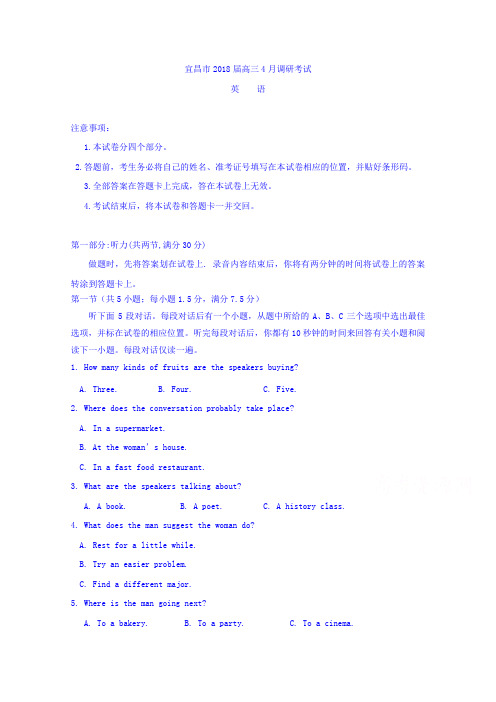
宜昌市2018届高三4月调研考试英语注意事项:1.本试卷分四个部分。
2.答题前,考生务必将自己的姓名、准考证号填写在本试卷相应的位置,并贴好条形码。
3.全部答案在答题卡上完成,答在本试卷上无效。
4.考试结束后,将本试卷和答题卡一并交回。
第一部分:听力(共两节,满分30分)做题时,先将答案划在试卷上. 录音内容结束后,你将有两分钟的时间将试卷上的答案转涂到答题卡上。
第一节(共5小题;每小题1.5分,满分7.5分)听下面5段对话。
每段对话后有一个小题,从题中所给的A、B、C三个选项中选出最佳选项,并标在试卷的相应位置。
听完每段对话后,你都有10秒钟的时间来回答有关小题和阅读下一小题。
每段对话仅读一遍。
1. How many kinds of fruits are the speakers buying?A. Three.B. Four.C. Five.2. Where does the conversation probably take place?A. In a supermarket.B. At the woman’s house.C. In a fast food restaurant.3. What are the speakers talking about?A. A book.B. A poet.C. A history class.4. What does the man suggest the woman do?A. Rest for a little while.B. Try an easier problem.C. Find a different major.5. Where is the man going next?A. To a bakery.B. To a party.C. To a cinema.第二节(共15小题;每小题1.5分,满分22.5分)听下面5段对话或独白。
武汉市2018届高中毕业生四月调研测试

武汉市2018届高中毕业生四月调研测试英语试卷本试题卷共12页,72题。
全卷满分150分。
考试用时120分钟★权考试顺利★注意事项:1.答题前,先将自己的姓名、准考证号填写在试题卷和答题卡上,并将准考证号条形码粘贴在答题卡上的指定位置。
2.选择题的作答:每小题选出答案后,用2B铅笔把答题卡上对应题目的答案标号涂黑。
写在试卷、草稿纸和答题卡上的非答题区域均无效。
3.非选择题的作答:用黑色签字笔直接答在答题卡上对应的答题区域内。
写在试卷、草稿纸和答题卡上的非答题区域均无效。
4.考试结束后,本试卷和答题卡一并上交。
BWhen I graduated from the University of lowa last year, I did something my friends did not understand. I left lowa,,where I had friends and stability, to live on a small houseboat near San Francisco. At school, I had found a job driving a school bus so people asked, "Why on earth are you leaving”Well,at graduation I was presented with two things — a degree in psychology and a question. It was the same one that many in my generation got::" What do I do now" It was as difficult as it was common .That's because many people at my age were raised with the same words, repeated over and over by parents, teachers and TV, that you “can be whatever you want to be”As a young boy, every time when I was puzzled about my future, they would say that they would be happy if I was happy. However, what I needed was concrete advice but not a vague idea, for example, "be a doctor, or be a bus driver."My experience was by no means universal. Many Americans are taught by their parents that the only purpose in life is to attain money and power. As a goal, this seems much easier and clearer than finding "happiness" or "gentleness". The result of this upbringing is that many of my classmates did not specialize in any particular skill, rather assuming that something would magically happen to overcome their problems. They often get a real shock when they enter the“real world” and find that their options are very limited. Many of my friends have taken jobs as waiters or cooks after graduating, or have moved back in with their parents.My life on the boat is hard at times, especially during storms. But this is my small attempt to be happy on my own. I'm not buying into my nation’s idea of limitless possibilities because I feel that stops the growth of today’s youth.was the friends confused about the writer’s leavingA. He was tired of drivingB. He suddenly quit schoolC. He would lose his friendsD. He would lead a changing life.26. What does the author think of the guidance he got from American societyA. It's specificB. It’s wrongC. It's generalD. It’s correct27. What directly caused a lot of Americans to have jobs lower than their expectationsA. Their achievable goals.B. The practical guidance.C. Being shocked by the real world.D. Lacking professional competence.28. Which of the following can be the best title for the textA. Stay where you are.B. Be whatever you want to be.C. Blind faith in an industrial society.D. Mistaken belief in limitless possibilities.DWhen a mathematics student was examined in the hospital, Dr. John Lorber discovered that he had almost no brain at all. Normally, the condition is quite severe in the first months of childhood. Even when someone survives he or she is usually seriously disabled. Somehow,though, the student had lived a perfectly normal life and went on to gain a degree in mathematics. This case is by no means as rare as it seems.Professor Lorber has identified(确认) several hundred people who have very small brains but who appear to be normal intelligent people. Some of them he describes as having "no detectable brain", yet they have scored up to 120 on IQ tests.No one knows how people with "no detectable brain" are able to function at all, let alone graduate in mathematics. One suggestion is the old idea that we only use a small percentage of our brains anyway—perhaps as little as 10 per cent. But more recent research shows this idea is a misunderstanding dating from research in the 1930s in which the functions of large areas of the brain could not be determined and were named "silent", while in fact they are linked withimportant functions like speech and abstract thinking.The other interesting thing about lorber's findings is that they remind us of the secret of memory. At first it was thought that there is a part in the brain for memory, like the memory chips in a PC. But further research of the brain has turned up the surprising fact that memory does not depend on any particular area in the brain. As one scientist put it ,“Memory is everywhere in the brain and nowhere.”But if the brain is not a place for classifying and storing experiences and analyzing them to enable us to live our lives,then what on earth is the brain for And where is the seat of htthen what on earth is the brain for And where is the seat of human intelligence Where is the mind29. What will usually happen to a very young baby without brainA. It will die.B. It will surviveC. It will be intelligentD. It will become disabledis the new finding of the functions of brainA. Much of the brain is usefulB. The brain is in fact of no useC. The brain determines one's IQ.D. Only a small part of the brain七选五These days when someone says a computer has a bug(臭虫)in it,usually they means that there’s a problem with one of its programs. Maybe your computer crashed when you were in the middle of a game. 36 .But back in the early days of computers, a woman named Grace Hopper was part of the team that discovered the very first computer bug.37 She had been invited to help program a new computer. The job of which was to quickly deal with the math problems ships used to find their way. 38 .Then it translated the patterns of holes into the math problems it was supposed to solve.One afternoon in 1947 Hopper and her team were running a program. But the computer wasn't giving them the right results. 39 They finally ended up taking the computer apart,looking for problems. What did they find It was a dead moth(飞蛾)! The moth was blocking some of the holes on the paper— no wonder the computer didn‘t know what to do.Hopper knew that the term "bug" had been used before when there were problems with machines. But this was the first time a computer had ever had a bug. 40 Some people think Hopper was the first person to use the word "debug" to mean "get rid of the problems in a computer”.A What could be wrongB. Hopper was a mathematicianC. Who had operated the computerD. Hopper was a hardworking scientistE. She thought it was funny that it was a real one.F Or you got an error message when you tried to go to a websiteG. The computer worked by reading instructions from a long piece of paper with holes in it短文改错(共10小题;每小题1分,满分10分)I once had a bad experience. One day several years ago, I went shop with my friends. As l entered a small shoe store, but I saw two women selecting shoes. Suddenly they raise their voice and began to talk loudly about how beautifully the shoes were and how low the price was. Just then an old couple walked onto the s hop. The two women urged her to buy a pair .When the couple left a store with the shoes, I noticed the shop owner give the two women some cashes. He also promised offer them more unless more people bought his shoes.完形填空(共20小题;每小题分,满分30分)Justin knew there was only one way out of his neighborhood- basketball. So he 41 hard, running with the ball like the 42 dogs were chasing(追逐) him. He could defeat any of the guys at the 43 ,and he saw his way out and he ran for it..One day when Justin was playing basketball, he 44 his right knee badly. The doctor said he might never play 45 . Justin was extremely sad. Every day Justin just 46 in bed, watching TV and eating potato chips. When he 47 like a balloon, his sister came home from the university on holiday, bringing exciting 48 of a faraway land called college.Justin was 49 by the dorm room stories and campus(校园)50 that she told, but he could 51 believe any of it. It was as if she were telling him about some 52 land high above the clouds.Justin was a pretty 53 guy, but his sister had a way of 54 him to do things that nobody else could. So while she was home on 55 , they studied together, and they talked ,and they worked, and Justin felt 56 than he ever had before.After spending those 57 with his sister, Justin realized that he didn't want to feel bad for himself any more ,and he didn't want to quit Basketball 58 be his thing, but now there was only 59 . Using the study skills Justin had acquired from his sister, he scored 60 in every exam. The university that he applied to accepted him.。
2018年湖北省高三四月调考英语试题分析及备考建议
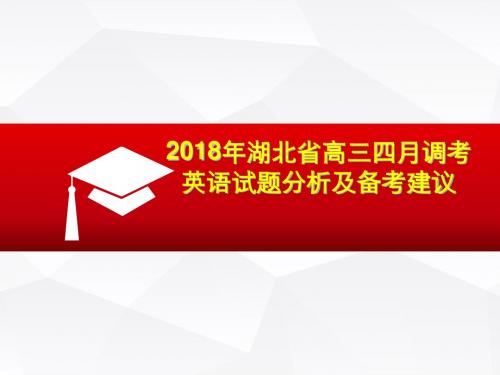
一
考纲回顾
二
三
试题分析
备考建议
高考评价体系 :“一体四层四冀” 一体:立德树人、服务选拔、导向教学 四层:必备知识、关键能力、学科素养、 核心价值
四翼:基础性、综合性、应用性、创新性
教育部考试中心主任姜钢解读高考改革思路,被称为高考命题“风 向标”
七选五
完形填空 货运司机途中主动救援的感人故事 语法填空 英国记者受邀参观成都熊猫基地的经历 短文改错 伯伯开餐馆成功的秘诀 书面表达 请外教审读润色已写好的申请书和个人简历
反思与预测 所有选材: 语言材料真实、语言地道、通俗易懂,有浓厚的时代 和生活气息,题材丰富多样,语言俏皮生动有趣,全 方位地向考生展示英语国家的社会、文化、历史、科 技等方面的情况。也体现了对中国文化的考核力度。
“四层”:通过明确“必备知识、关键 能力、学科素养、核心价值”四层考查 目标,回答了高考“考什么”的问题。 第一圈层“必备知识” 强调考查学 生长期学习的知识储备中的基础性、通 用性知识,是学生今后进入大学学习以 及终身学习所必须掌握的。
第二圈层“关键能力”重点考查学生所学 知识的运用能力,强调独立思考、分析问题 和解决问题、交流与合作等学生适应未来不 断变化发展社会的至关重要的能力。 第三圈层“学科素养”要求学生能够在不 同情境下综合利用所学知识和技能处理复杂 任务,具有扎实的学科观念和宽阔的学科视 野,并体现出自身的实践能力、创新精神等 内化的综合学科素养。
英语学科如何体现考试核心思想
“三位一体”和“双四方针”是高考考试制度改革的 核心。 1.英语不同于其他学科有其自身特点; 2.英语学科主要任务:通过语言介绍国外文化和传递 我国文化; 3.英语试卷:关键是通过选材来树立正确认知观,同 时也能体现中华优秀文化价值取向。 注意:鉴于学科特点,不能以牺牲西方语言的地道性 和美感为代价,一味牵强追求。只能尽量在试题中有 所体现。
武汉市2018届高三四月调研测试英语(2018武汉高三4月调考英语)
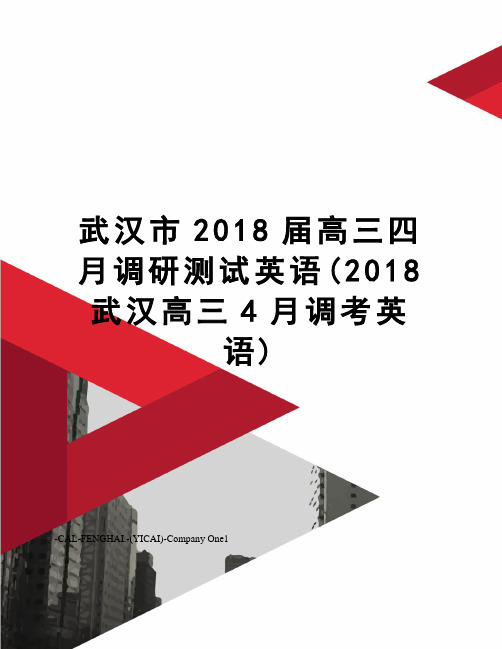
武汉市2018届高三四月调研测试英语(2018武汉高三4月调考英语)-CAL-FENGHAI.-(YICAI)-Company One1武汉市2018届高中毕业生四月调研测试英语试卷武汉市教育科学研究院命制 2018.4.20本试题卷共12页,72题。
全卷满分150分。
考试用时120分钟。
★祝考试顺利★注意事项:1.答卷前,考生务必将自己的学校、考号、班级、姓名等填写在答题卡上。
2.选择题的作答:每小题选出答案后,用2B铅笔把答题卡上对应题目选项的答案信息点涂黑,如需改动,用橡皮擦干净后,再选涂其他答案标号,答在试题卷、草稿纸上无效。
3.填空题和解答题的作答:用0. 5毫米黑色签字笔直接答在答题卡上对应的答题区域内,答在试题卷、草稿纸上无效。
4.考生必须保持答题卡的整洁。
考试结束后,将试题卷和答题卡一并交回。
第一部分听力(共两节,满分30分)做题时,先将答案标在试卷上。
录音内容结束后,你将有两分钟的时间将试卷上的答案转涂到答题卡上。
第一节(共5小题;每小题1.5分,满分7.5分)听下面5段对话。
每段对话后有一个小题,从题中所给的A、B、C三个选项中选出最佳选项,并标在试卷的相应位置。
听完每段对话后,你都有10秒钟的时间来回答有关小题和阅读下一小题。
每段对话仅读一遍。
例:How much is the shirt?A. £ 19.15.B. £ 9.18.C. £ 9.15. 答案是C。
1. What day is it todayA. Wednesday.B. Thursday.C. Saturday.2. What are the speakers talking about?A. Preparing a party.B. Planning the weekend.C. Helping the teacher.3.What does the man advise the woman to do?A. Buy a computer.B. Complete a paper.C. Clean the kitchen.4.What’s the p robable relationship between the two speakers?A. Student and teacher.B. Classmates.C. Schoolmates.5.Which part did the man do badly in?A. Reading.B. Listening.C. Speaking.第二节(共15小题;每小题1.5分,满分22.5分)听下面5段对话或独白。
2018武汉四调英语试卷
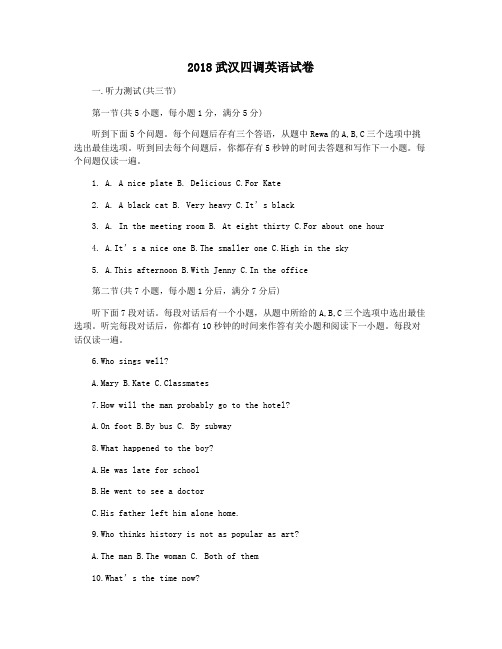
2018武汉四调英语试卷一.听力测试(共三节)第一节(共5小题,每小题1分,满分5分)听到下面5个问题。
每个问题后存有三个答语,从题中Rewa的A,B,C三个选项中挑选出最佳选项。
听到回去每个问题后,你都存有5秒钟的时间去答题和写作下一小题。
每个问题仅读一遍。
1. A. A nice plate B. Delicious C.For Kate2. A. A black cat B. Very heavy C.It’s black3. A. In the meeting room B. At eight thirty C.For about one hour4. A.It’s a nice one B.The smaller one C.High in the sky5. A.This afternoon B.With Jenny C.In the office第二节(共7小题,每小题1分后,满分7分后)听下面7段对话。
每段对话后有一个小题,从题中所给的A,B,C三个选项中选出最佳选项。
听完每段对话后,你都有10秒钟的时间来作答有关小题和阅读下一小题。
每段对话仅读一遍。
6.Who sings well?A.MaryB.KateC.Classmates7.How will the man probably go to the hotel?A.On footB.By busC. By subway8.What happened to the boy?A.He was late for schoolB.He went to see a doctorC.His father left him alone home.9.Who thinks history is not as popular as art?A.The manB.The womanC. Both of them10.What’s the time now?A.10:15B.10:30C.10:4511.Where are the two people?A. In the man’s officeB.In the woman’s homeC. In a restaurant12.What does the woman mean?A.She has just bought a new car.B.She has no time to help the man.C.She will drive the man to the station.第三节(共13小题,每小题1分后,满分13分后)听下面4段对话或独白。
- 1、下载文档前请自行甄别文档内容的完整性,平台不提供额外的编辑、内容补充、找答案等附加服务。
- 2、"仅部分预览"的文档,不可在线预览部分如存在完整性等问题,可反馈申请退款(可完整预览的文档不适用该条件!)。
- 3、如文档侵犯您的权益,请联系客服反馈,我们会尽快为您处理(人工客服工作时间:9:00-18:30)。
第一部分听力(共两节,满分30分)做题时,先将答案标在试卷上。
录音内容结束后,你将有两分钟的时间将试卷上的答案转涂到答题卡上。
第一节(共5小题;每小题分,满分分)听下面5段对话。
每段对话后有一个小题,从题中所给的A、B、C三个选项中选出最佳选项。
听完每段对话后,你都有10秒钟的时间来回答有关小题和阅读下一小题。
每段对话仅读一遍。
例:How much is the shirtA. £19. 15.B. £9. 18.C. £9. 15.答案是C。
1. What does the woman think about the food in ChinaA. It’s not good.B. It’s fatty.C. It’s delicious.2. What is Frank looking forA. His money.B. A film ticket.C. An envelope.3. What are the speakers talking aboutA. A Sunday planB. A sports meeting.C. A school trip.4. Where is the man going toA. The Zoo Road.B. The Park Road.C. The King Road.5. How is Alice’s weekendA. Dull.B. Average.C. Interesting.第二节(共15小题;每小题分,满分分)听下面5段对话或独白。
每段对话或独白后有几个小题,从题中所给的A、B、C三个选项中选出最佳选项。
听每段对话或独白前,你将有时间阅读各个小题,每小题5秒钟;听完后,各小题将给出5秒钟的作答时间。
每段对话或独白读两遍。
听第6段材料,回答第6、7题。
6. Which room does Susan stay inA. Room 302.B. Room 305.C. Room 310.7. What is SusanA. A clerk.B. A guard.C. A tour guide.听第7段材料,回答第8、9题。
8. What time will they go to see the SmithsA. At 4:15.B. At 4:00.C. At 3:30.9. Where will they meetA. At the bus stop.B. At Jack’s sister’s.C. Opposite the cinema.听第8段材料,回答第10至12题。
10. What does the man think of Professor Holt’s classA. It’s boring.B. It’s attractive.C. It’s ordinary.11. What is the probable relationship between the two speakersA. Teacher and student.B. Colleagues.C. Schoolmates.12. What do we know about Professor Vance and Professor HoltA. They’re the same.B. They’re different.C. They’re outstanding.听第9段材料,回答第13至16题。
13. What is the girl going to rentA. A house.B. A room.C. A flat.14. How would the girl like to go to schoolA. By car.B. By bus.C. On foot.15. What was the girl’s feeling about the first year in the universityA. It was amazing.B. Life was boring.C. The food was terrible.16. Who does the university provide accommodation forA. All the students.B. The second year students.C. The first year students.听第10段材料,回答第17至20题。
17. How many women drivers wear sunglasses while drivingA. 12 million.B. million.C. million.18. What do experts suggestA. Buying thick sunglasses.B. Considering safety first.C. Wearing pink sunglasses.19. What percentage of women drivers are against the law due to sunglassesA. 7 %.B. 82%.C. 10%.20. What is the probable reason for women to buy sunglassesA. Road safety.B. Practical use.C. Better appearance.第二部分阅读理解(共两节,满分40分)第一节(共15小题;每小题2分,满分30分)阅读下列短文,从每题所给的A、B、C和D四个选项中,选出最佳选项。
ATaking your English into the real worldThere is nothing quite like trying out your English in a country where the natives speak it fluently. Chen Yuan, a 24-year-old senior from Fudan University, Shanghai, faced a series of challenges while visiting Europe, Australia and the US.What was the first thing you noticed when you arrivedWhen I first arrived, my biggest problem was that I didn’t know any sla ng terms (俚语). I was greeting people with, "How are you" while everyone else was saying, "What’s up" I was finding it hard to communicate with local people even when they used simple words.What were the differences between the English you learned in the classroom, and the English you had to use abroad In the classroom I would remember patterns of speech. I knew that when someone asked, "How are you" I should reply, "Fine, thank you. And you" The problem came when people replied to me in different w ays. I didn’t know how to continue the conversation.What was the hardest thing to adapt toLife in the West is very different. In the US I found it hard to travel about, as there was not much public transport. In New York there may be a subway, but it was hard to find a bus. In some smaller cities, everyone drove a car. It is not easy for a backpacker to travel around these places. I also didn’t enjoy a lot of the food, because I think I was too used to Chinese cooking.Tell us a funny story from your time abroadWhen I first arrived in Britain, I wanted to buy some shoes, but didn’t know the word for pigskin or leather. I asked the salesman, "Are the shoes made of beef or pork" I still remember the look on his face.21. What was Chen Yuan’s biggest barrier when she first arrived abroadA. How to communicate.B. How to travel.C. What to eat.D. What to buy.22. What probably was the root of her communication problemsA. The way she greeted peopleB. The way people replied to herC. The way she started a conversationD. The way she learned English in class23. Which means of transport worried Chen Yuan in New YorkA. Bus.B. Car.C. Subway.D. Railway.24. Where can we most probably find this articleA. In a travel brochure.B. In a daily newspaper.C. In a historical novel.D. In a fashion magazine.BI had an unannounced visit from an unwelcome guest last night. My PC was hit by a virus and I spent all night dealing with the mess it caused. I don’t really know when it happened but the problems just started coming out suddenly last night.Luckily I had just backed up all my documents a week before but I’m still working on getting the operating system up and running. When I set up the computer a few years ago I went through and created recovery CDs, so I’m trying to use those to recover the PC back to the way it was out of the box.I’m not exactly sure how the virus came onto my PC but I was behind on both my anti-virus updates and Windows updates so I imagine that had something to do with it. This was not exactly the way I was planning on spending my evening and morning. I absolutely hate wasting time on productivity (生产率) black holes like this. I wonder how many hours of productivity are lost each year due to the effects of viruses.Anyhow, it may be a day or two before I’m back up and going again. Needless to say there will be some upcoming mails on backing up your data, keeping current (现在的) on your updates, and a review of the best anti-virus software.25. What happened to the author’s computerA. The software was lost.B. His documents were stored.C. Someone came and stole it.D. A deadly virus dropped by.26. Why did the author hate productivity black holes so muchA. His time was wasted.B. They ruined all the files.C. His PC was out of the box.D. He was behind on updates.27. What will the author have to do before the problem is solvedA. Buying software.B. Updating software.C. Reviewing the data.D. Creating recovery CDs.CWe’re used to watching the price of oil mock gravity, but there’s an even more necessary product that’s also become scarcer and more expensive in recent months: Traders are paying record prices for wheat on world markets, thanks in part to shortages caused by a mix of droughts (干旱) and flooding. Canada, the second-biggest wheat producer after the ., looks set to harvest its smallest crop in five years, due to an unusually dry July, while production in the European Union and Australia may be down nearly 40% from last year after flooding rains followed long droughts. Growing global demand for biofuels is also eating up grain production, and putting up prices.As a result of the supply squeeze, global stores of wheat — which makes up one-fifth of the world’s food intake — are expected to fall to their lowest level in 26 years, according to the . Department of Agriculture.Tighter supplies mean American consumers will be paying a few cents more for everything from bread to sandwiches to hamburgers, as meat supplies can be tied to grain prices. And, if the world warms as expected over the coming decades, the terrible farming year of 2016 may be just the beginning. As temperatures rise, many studies predict that crop productivity will decline, as the extreme droughts and floods that damaged this year’s wheat crops become more common. The richest land is likely to be found further north in response to the heat, opening up the possibility of agriculture in areas such as Siberia that has long been too cold for good farming. But the same effect could turn today’s bread-basket regions as the American Midwest into dust bowls.28. Which of the following can best replace the underlined part “mock gravity” in Paragraph1A. changeB. closeC. increaseD. decrease29. Which area is thought to produce the most wheat in the worldA. .B. Canada.C. Australia.D. European Union.30. What does the author suggest by mentioning Siberia in the last paragraphA. Food prices will shoot up.B. Extreme weather might stay.C. It used to be suitable for farming.D. Farming methods have improved.31. What does the passage mainly talk aboutA. Crop productivity.B. Extreme weather.C. Wheat shortage.D. Severe droughts.DThere have been claims that warming on Mars and Pluto is proof that the recent warming on Earth is caused by an increase in solar activity, and not by greenhouse gases. But we can say with certainty that, even if Mars, Pluto or any other planet has warmed in recent years, it is not due to changes in solar activity.The Sun’s energy output has not increased since direct measurements began in 1978. If increased solar output really was responsible, we should be seeing warming on all the planets and their moons, not just Mars and Pluto.Our solar system has eight planets, three dwarf planets and quite a few moons with at least a thin atmosphere, and thus a climate of sorts. Their climates will be affected by local factors such as orbital variations, changes in reflectance and even volcanic eruptions, so it would not be surprising if several planets and moons turn out to be warming at any one time.One theory is that winds have recently swept some areas of Mars clean of dust, darkening the surface, warming the Red Planet and leading to further increases in windiness --- a positive feedback effect.Observations of the thickness of Pluto’s atmosphere in 2002 suggested the dwarf planet was warming even as its orbit took it further from the Sun. The finding confused astronomers at the time, and the cause had yet to be determined.It has since been suggested that this is due to a greenhouse effect: As it gets closer to the Sun, Pluto may warm enough for some of the methane ice on its surface to turn into a gas. This would cause further warming, which would continue for a while even after Pluto’s orbit starts to take it away from the Sun.32. What cause(s) the warming of some planetsA. The solar system.B. Their local factors.C. Volcanic mountains.D. The thin atmosphere.33. What is the outcome of the recent winds on MarsA. They’ve cooled the planet.B. They’ve left a clear sky.C. They’ve caused more winds.D. They’ve helped clean the planet.34. What do we know about the thickness of Pluto’s atmosphereA. It remains mysterious.B. It troubled astronauts.C. It has become thinner.D. It contributes to the warming.35. Which of the following might lead to the warming on Earth according to the writerA. Solar activity.B. Mars and Pluto.C. Greenhouse gases.D. T he Sun’s energy output.第二节(共5小题;每小题2分,满分10分)根据短文内容,从短文后的选项中选出能填入空白处的最佳选项。
